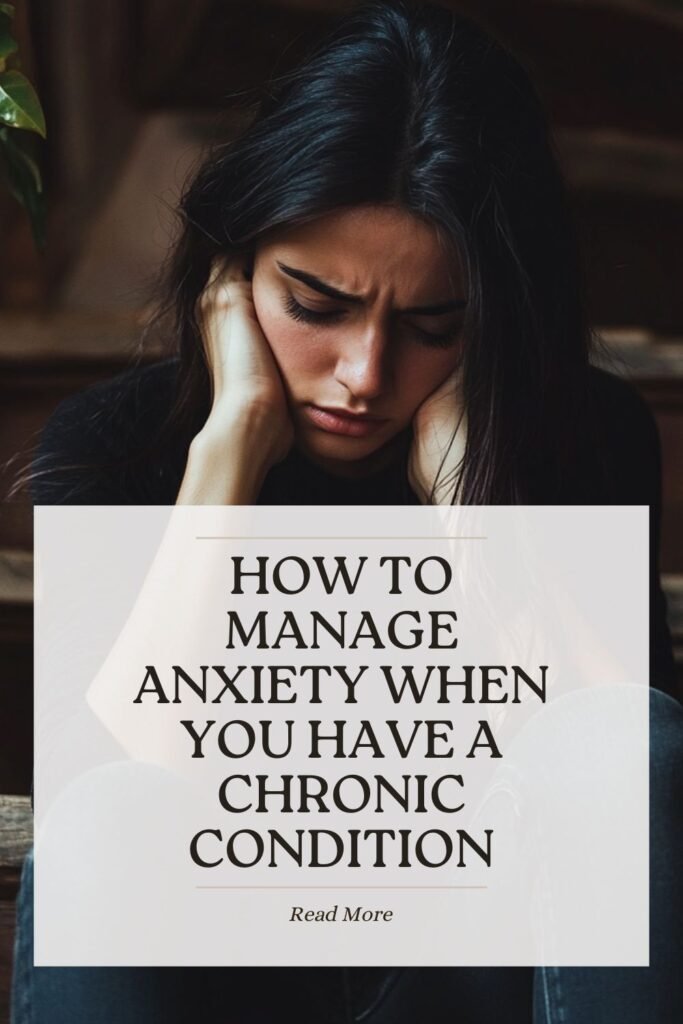How to Manage Anxiety When You Have a Chronic Condition
Living with a chronic condition can feel like you’re constantly balancing on a tightrope. You’re managing symptoms, doctor’s appointments, and daily life, all while anxiety looms in the background (or maybe the foreground).

If you’ve been there, you know how draining it can be. The good news is there are ways to manage anxiety and take control of your mental well-being, even when your body has other plans.
Let’s talk about how to get through the day-to-day challenges without letting anxiety run the show.
Acknowledge Your Feelings (No Judgment)
First things first: it’s okay to feel anxious. Living with a chronic condition often comes with a lot of unknowns, and those can trigger anxiety.
The key here is acknowledging those feelings without beating yourself up. You’re human, and feeling overwhelmed or anxious is entirely normal.
Instead of pushing those feelings away, try to recognize and accept them. Once you accept how you’re feeling, you can begin to find ways to manage it.
Tip: Journaling can be a powerful tool for expressing your emotions. Write down how you’re feeling and what might be causing it. Sometimes, putting it on paper can help make things clearer and less overwhelming.

Create a Routine You Can Control
One of the most frustrating things about having a chronic condition and how to Manage Anxiety is the unpredictability.
You’re feeling fine one day, and your symptoms flare up the next day. While you can’t always control your body’s response, you can create a routine that offers stability.
Establishing a daily routine can help reduce the anxiety that comes from not knowing what’s coming next.
It doesn’t have to be rigid, just something you can rely on, whether it’s a morning meditation, a short walk, or a relaxing bedtime ritual.
Break It Down: One Day at a Time
When managing both your condition and anxiety, it’s easy to get overwhelmed by the big picture.
Instead, focus on breaking down your day into manageable chunks. What’s something small you can accomplish today?
This approach helps keep anxiety in check because you focus on the now rather than worrying about what might happen later. Small wins are still wins!
Tip: Write a list of three small tasks you’d like to accomplish each day. Crossing them off can bring a sense of achievement and relief, even on tougher days.
Use Breathing Techniques to Calm Your Mind
Anxiety often feels like a storm brewing inside you. But when you focus on your breath, you can calm that storm, even briefly.
Breathing exercises are one of the simplest yet most effective ways to reduce anxiety. The best part? You can do them anytime, anywhere.
Try inhaling for four counts, holding your breath for four counts, and then exhaling for four counts.
This can quickly bring a sense of calm and control when things feel overwhelming.
Tip: Set a reminder on your phone to pause for a 5-minute breathing break a few times throughout your day. Those small breaks can make a big difference in how you feel.

Stay Connected with Others
Anxiety can make you want to retreat from the world, but isolation often makes things worse. Staying connected with friends, family, or support groups can be a huge help.
Sometimes, just having someone to talk to who understands what you’re going through can ease the weight of anxiety.
Whether it’s a quick phone call, a video chat, or even an online support group, don’t hesitate to reach out when you need someone to talk to.
Tip: If you’re not up for socializing but still want to feel connected, online communities can offer a sense of belonging without the pressure to meet face-to-face. Many chronic condition groups are active and full of understanding people going through similar experiences.
Make Room for Rest
Let’s be honest: Managing anxiety with a chronic condition is exhausting. Combine that with anxiety, and it can feel like you’re always running on empty.
That’s why making room for rest in your life is crucial. Whether it’s physical rest for your body or mental rest for your mind, make sure you’re giving yourself time to recharge.
Don’t feel guilty for needing more rest than others; your body is already doing a lot of work to keep going.
Tip: Incorporate short, intentional breaks into your day. Even five minutes of closing your eyes or doing a quick meditation can improve your mood.
Practice Self-Compassion
We often tend to be our own worst critics, especially when anxiety and chronic illness collide.
But giving yourself grace is one of the best things you can do for your mental health.
It’s easy to feel frustrated with your body or blame yourself for being unable to do more. However, self-compassion is crucial to managing anxiety.
Remind yourself that you’re doing your best, even if it doesn’t always feel that way. Be kind to yourself the way you’d be kind to a friend.
Tip: Create a list of affirmations that resonate with you, such as “I am strong” or “I am doing my best.” On tough days, revisit that list as a reminder of your resilience.

Seek Professional Support When You Need It
Sometimes, anxiety can feel too overwhelming to manage on your own, and that’s okay.
There’s no shame in seeking professional help through therapy, counseling, or even medication.
Talking to a mental health professional can give you tools and coping strategies tailored to your needs.
If your chronic condition is contributing to your anxiety, consider finding a therapist who specializes in chronic illness or health-related anxiety.
They can offer insights and support that align with what you’re going through.
Tip: If traditional therapy isn’t your style, many therapists now offer virtual or text-based options, making it easier to get help without leaving the comfort of your home.
Managing anxiety alongside a chronic condition is no easy task, but it’s not impossible.
Focusing on what you can control, creating calming routines, and reaching out for support when needed can help you manage your mental and physical health easily.
Managing anxiety when you have a chronic condition is crucial for your overall well-being.
Creating a support system of friends, family, or healthcare professionals who can provide emotional support is essential.
Relaxation techniques such as deep breathing exercises or mindfulness can help reduce anxiety levels.
Remember to prioritize self-care and engage in activities that bring you joy and peace, as they can also contribute to managing anxiety.
Remember, it’s okay to feel how you’re feeling, and you don’t have to do it alone.
Take it one day at a time, and don’t forget to celebrate your progress, even the small victories. You’ve got this!






